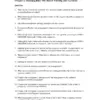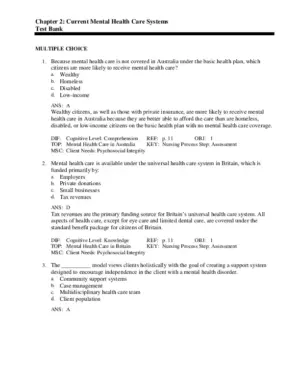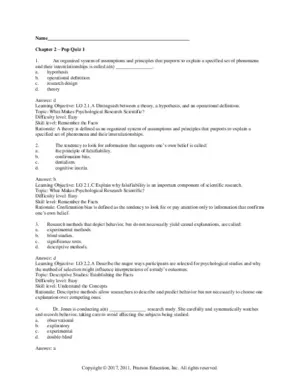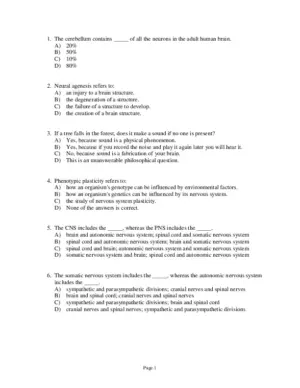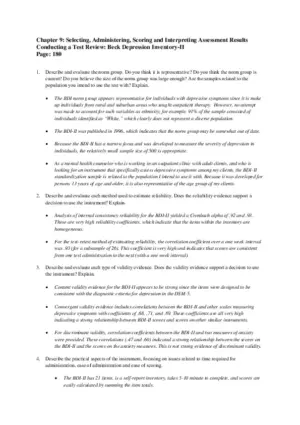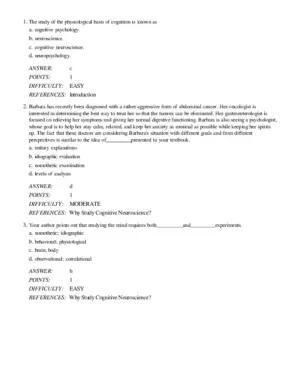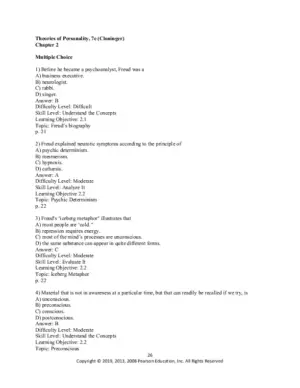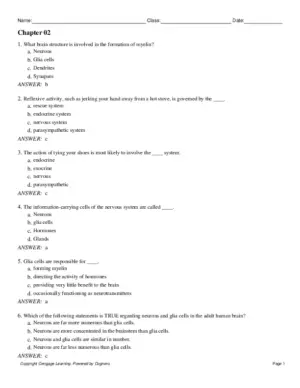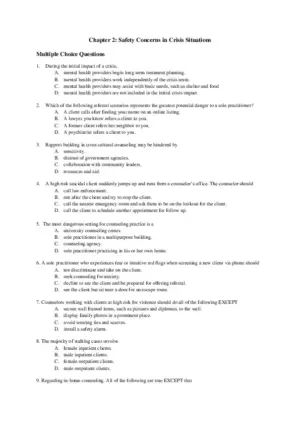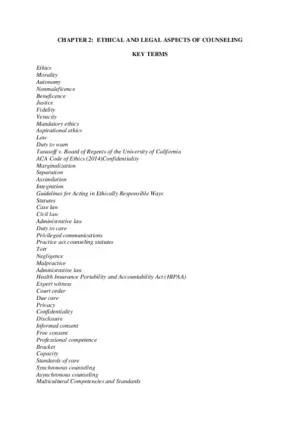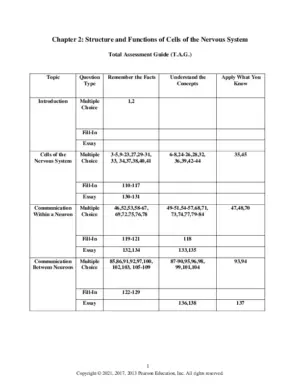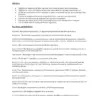-
Auditing: Assurance and Risk, 3rd Edition Test Bank
- Vendor:
Henry Lewis
Test Bank for Substance Use Counseling: Theory and Practice, 6th Edition
Preview Extract
Chapter 2: Ethical and Legal Issues in Substance Abuse Counseling
Objectives
•
•
•
•
•
•
•
Highlight the complexity of ethical and legal issues facing substance abuse professionals.
Highlight the varied credentialing and licensing requirements for substance abuse counselors.
Identify the federal and state laws pertaining to counselors in general and specific to substance abuse
counselors.
Illustrate the conflicts between and amongst federal laws, state laws, and ethical codes.
Emphasize the importance of competently serving diverse populations.
Emphasize the increased risk of dual relationships of recovered substance abuse counselors.
Provide ethical decision-making models and suggestions.
Key Terms and Definitions
Autonomy: The therapist’s responsibility to support client independence and freedom of choice.
Beneficence: The therapist’s responsibility to do what is in the best interest of the client.
Confidentiality: Confidentiality is considered the core value of mental health professionals and is intended to
reduce stigma, foster trust, protect privacy, and allow clients to control access of information they have shared.
Consent: The client’s permission to release confidential information.
Duty to Protect: The therapist’s responsibility to protect or lessen the threat by either contacting authorities or
the targeted person, but not necessarily both.
Duty to Warn: The therapist’s legal duty to warn a person who may become a victim of a violent act by a client.
Fidelity: The therapist’s responsibility to remain loyal to the client.
Health Care Providers: Any provider, or third party on behalf of the provider, who electronically transmits
health information for the purpose of claims submissions, inquiries about patient eligibility benefits, and
authorizing referrals.
Health Plans: Health insurance companies, health maintenance organizations (HMO’s), Medicare, Medicaid,
and other health carriers.
Health Care Clearinghouses: Billing services, community health management information systems, and other
processing systems.
Informed Consent: The legal and ethical requirement of therapists to inform the client of the potential risks and
benefits of counseling.
Justice: The therapist’s responsibility to act fairly, avoid bias and stereotypes.
Nonmaleficence: The therapist’s responsibility to do no harm.
Veracity: habitual observance of truth in speech or statement; truthfulness; correctness or accuracy.
Key Websites
American Counseling Association,
Association for Assessment in Counseling (AAC)
American Mental Health Counselors Association (AMHCA)
American Rehabilitation Counseling Association
American School Counselor Association (ASCA)
Association for Spiritual, Ethical & Religious Values in Counseling
Council on Accrediting Counseling and Related Educational Programs (CACREP)
Counselors for Social Justice (CSJ)
International Association of Marriage and Family Counselors
NAADAC, the Association for Addiction Professionals
National Board for Certified Counselors and Affiliates
National Center on Elder Abuse
Substance Abuse and Mental Health Administration Services
Activities
1.
Research the prevalence of drug and alcohol abuse/ dependence and family violence, including child
abuse/ neglect and domestic abuse.
2.
Interview a substance abuse counselor and ask about ethical dilemmas he or she faced.
3.
Interview a school counselor and ask about ethical dilemmas he or she faced.
4.
Research national, state, and local organizations in your profession (or future profession) and review the
ethical codes.
5.
Research your current state laws regarding any of the following:
•
Mandatory reporting of child abuse/ neglect
•
Mandatory reporting of elder abuse
•
Mandatory reporting of domestic abuse
•
Mandatory duty to warn a potential victim of violence
•
Minor’s ability to consent to drug and alcohol abuse treatment
•
Parental access to minor records and confidential information
•
Certification requirements of substance abuse counselors
Essay Questions/ Discussion Starters
1.
Describe the diverse avenues for entering the profession of substance abuse counseling.
2.
Define confidentiality and privileged communication and describe common ethical limits to
confidentiality.
3.
Explain the purpose of CFR 42, Part 2, the information that is protected and the information that may be
disclosed without client consent.
4.
Explain the typical laws that pertain to the confidentiality of minors, both in and out of school settings.
Chapter 2 Multiple Choice Questions
1.
Which of the following does not contribute to the complexity of ethical and legal issues in substance
abuse counseling?
(a) Ethical Codes
(b) Personal Recovery
(c) Standards and Requirements
(d) Federal Laws
2.
Which of the following is not one of the moral principles on which ethical codes of mental health
organizations are based?
(a) Fidelity
(b)
(c)
(d)
Autonomy
Justice
Genuineness
3.
Who is not bound by confidentiality?
(a) The client
(b) The substance abuse counselor
(c) The supervisor
(d) The insurance company
4.
Which of the following does not allow for the reporting of child abuse?
(a) HIPAA
(b) CFR 42, Part 2
(c) ACA Code of Ethics
(d) None of the above
5.
Which law does not allow for a breach of confidentiality to warn a third party in imminent danger?
(a) HIPAA
(b) CFR 42, Part 2
(c) State Law
(d) None of the above
6.
When faced with conflicting laws or ethical codes the substance abuse counselor should always defer to:
(a) Federal laws
(b) State laws
(c) Ethical codes
(d) The most restrictive regulation or code
7.
According to CFR 42, Part 2, confidential information may be disclosed with client consent:
(a) For a third party payment
(b) To medical professionals in an emergency situation
(c) To family members in an emergency situation
(d) None of the above
8.
According to CFR 42, Part 2, disclosure of confidential information requires written consent with several
elements; which of the following is not one of the required elements?
(a) The name of the person or program permitted to make the disclosure
(b) The name of the person or program receiving the disclosed information
(c) The purpose of the disclosure
(d) A statement indicating that the client may revoke consent at any time but only if he or she states that
in writing
9.
According to HIPAA, client consent is not required for disclosure of confidential information for all the
following except:
(a) To the client’s employer
(b) For the opportunity to agree or object
(c) For treatment, payment, and health care operations
(d) For public interest and benefit activities
10.
Which of the following regulations restricts parental access of their children’s confidential information
without the minor’s consent?
(a) FERPA
(b) IDEA
(c) CFR 42, Part 2
(d) PPRA
11.
The commonalities between the ethical codes embrace the following common principles:
(a) Protecting the client welfare; avoiding harm and the imposition of personal values; and knowledge
and adherence to the laws and ethical codes
(b)
(c)
(d)
Professional qualifications and competence and knowledge of standards
Consultation and counselor supervision with other counseling professionals and competence to
administer, use or interpret assessment instruments
All of the above
12.
One important commonality that exists in all five of the highlighted ethical codes within the text is:
(a) The organization and titling of the ethical codes
(b) The focus on the counseling relationship competence
(c) The emphasis on confidentiality and client rights.
(d) None of the above
13.
Which of the following is not a characteristic of an ethical dilemma?
(a) A choice between two courses of action must be made
(b) There are significant consequences for not selecting either of the options
(c) Each decision is supported by ethical principles
(d) One of the decisions is supported by state regulations
14.
The ASCA supports the use of Stone’s (2001) Solutions to Ethical Problems in Schools for ethical
decision making. Which of the following is not one of the steps?
(a) Define the problem emotionally and intellectually
(b) Consider the setting, parental rights and minors’ rights along with the students’ chronological and
developmental levels
(c) Apply the moral principles and determine your potential courses of action and their consequences
(d) Apply the collaboration model.
15.
in:
Regarding professional conduct, substance abuse counselors need to be aware of requirements delineated
(a)
(b)
(c)
(d)
Federal and state laws
Local laws and regulations
Codes of ethics
All of these
16.
Which of the following groups do not have specific licensure/certification for substance abuse counseling?
(a) National Board of Certified Counselors
(b) National Association of Alcoholism and Drug Abuse Counselors
(c) US Department of Transportation
(d) None of these
17.
The legal and ethical requirement to inform clients of the potential risks and benefits of counseling is:
(a) Informed consent
(b) Duty to warn
(c) Privileged information
(d) Duty to protect
18.
In Counseling, the promise of keeping information private is called:
(a) Privacy
(b) Secrecy
(c) Confidentiality
(d) Concealment
19.
Lipari V. Sears, Roebuck & Co. was a federal case that further extended the duty of counselors to
_______________.
(a) Warn victims
(b) Protect unknown victims
(c) Protect identifiable victims
(d) All of the above
20.
The purpose of HIPAA is _______________.
(a) To protect individually identifiable health information
(b)
(c)
(d)
To increase the flow of information between health care providers, health plans, or third party on
behalf of the party
To encourage substance abusers to seek treatment without fear of discrimination, legal
ramifications, or fear of losing one’s job.
Both a and b
21.
HIPPA does not apply to _______________.
(a) Health information contained in health care provider records or in health plan records
(b) Health information contained in health care clearinghouses.
(c) Health information contained in employer records or in educational records
(d) None of the above
22.
Personal counseling notes are considered a school record ______________.
(a) The moment they are created
(b) The moment anyone other than the counselor knows of their existence
(c) The moment they are placed in the “permanent” school record file
(d) None of the above
23.
Confidentiality is considered the core value of mental health professionals is intended to:
(a) Reduce stigma and foster trust
(b) Protect privacy
(c) Allow clients to discuss their issues without fear of future repercussions
(d) All of the above
24.
The right of privilege of confidentiality belongs to:
(a) The client, even the deceased clients
(b) The counselor
(c) The counselor and client
(d) The consultant
25.
Which law requires the sharing of patient information through encrypted systems, with significant
penalties for failing to sufficiently protect client information?
(a) Health Insurance Portability Accountability Act (HIPAA)
(b) HITECH Act
(c) Patient Protection and Affordable Care Act
(d) All of the above
26.
Counselors may be ethically or legally obligated to break confidentiality, without client consent, in the
following limited situations:
(a) If the client intends to harm him/herself or an identifiable third party
(b) If a client intents to transmit a communicable, life-threatening disease to an identifiable third party
(c) If the client is a victim of child or elder abuse/neglect
(d) All of the above
27.
The purpose of __________ is to protect individually identifiable health information while increasing the
flow of information between health care providers, health plans, and health care clearinghouses.
(a) HITECH Act
(b) Patient Protection and Affordable Care Act
(c) HIPAA
(d) FERPA
28.
The purpose of __________ is to provide affordable health care to uninsured Americans, to better detect
mental health issues, and to provide better integration of healthcare.
(a) HITECH Act
(b) Patient Protection and Affordable Care Act
(c) HIPAA
(d) FERPA
29.
The individually identifiable health information that is protected by HIPAA includes all of the following
EXCEPT:
(a)
(b)
condition
(c)
(d)
Health information contained in employer records or in educational records
Demographic data regarding an individual’s past, present or future physical or mental health
Information related to the provision of health care to the individual
Payment for health care to the individual
30.
Health care providers must furnish a privacy practices notice to clients no later than the __________
service encounter.
(a) First
(b) Second
(c) Third
(d) Fourth
31.
According to the _________, the professional school counselor has a primary obligation to the student and
is knowledgeable of the laws, regulations, and policies aimed at protecting students’ rights.
(a) American Counselor Association (ACA)
(b) American School Counselor Association (ASCA)
(c) American Mental Health Counselors Association (AMHCA)
(d) All of the above
32.
__________ refers to an immediate serious threat.
(a) Critical peril
(b) Significant risk
(c) Imminent danger
(d) Pending hazard
33.
__________ gies parents the right to inspect school records.
(a) HITECH Act
(b) Patient Protection and Affordable Care Act
(c) HIPAA
(d) FERPA
34.
__________ was intended to ensure that students with disabilities receive a free appropriate education
(FAPE) with accommodations in the least restrict environment (LRE).
(a) Individuals with Disabilities Education Act of 2004 (IDEA)
(b) Protection of Pupil Rights Amendment of 1994 (PPRA)
(c) CFR 42, Part 2 in Regard to Minors
(d) Hatch Amendment
Chapter 2
1.
2.
3.
4.
5.
6.
7.
8.
9.
B (p. 26)
D (p. 30)
A (p. 32)
D (pp. 34, 35, 42)
B (p. 34)
D (p. 43)
B (p. 34)
D (p. 34)
A (pp. 35-36)
10.
11.
12.
13.
14.
15.
16.
17.
18.
C (pp. 37, 40)
D (p. 30)
A (p. 30-32)
D (p. 43)
D (p. 43-44)
D (p. 30)
D (p. 27-30)
A (p. 38)
C (p. 32)27.
19. D (p. 33)
20. D (p. 35)
21. C (p. 35)
22. B (p. 39)
23. D (p. 32)
24. A (p. 32)
25. D (p. 32)
26. D (p. 32-33
C (p. 35)
28.
29.
30.
31.
32.
33.
34.
B (p. 36)
A (p. 35)
A (p. 36)
B (p. 38)
C (p. 38)
D (p. 38)
A (p. 39)
Document Preview (7 of 120 Pages)
User generated content is uploaded by users for the purposes of learning and should be used following SchloarOn's honor code & terms of service.
You are viewing preview pages of the document. Purchase to get full access instantly.
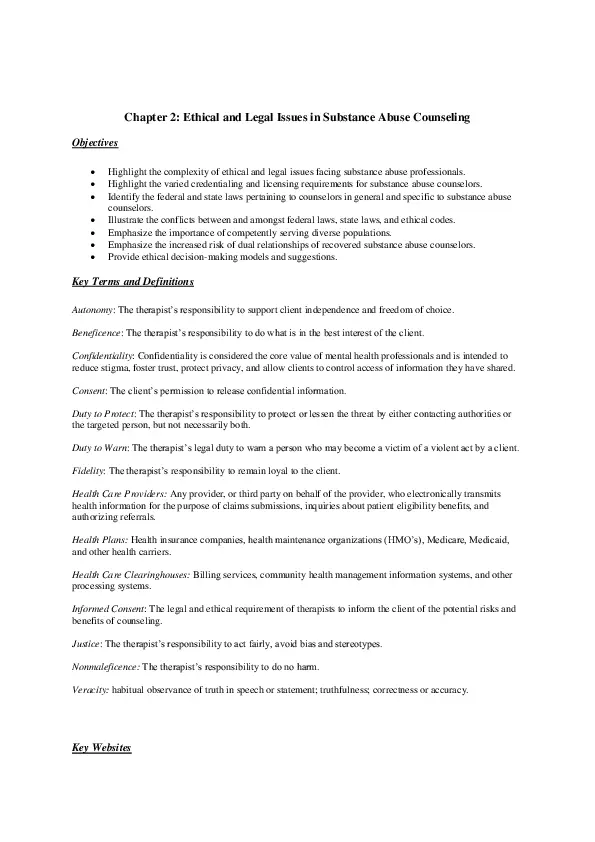
-37%
Test Bank for Substance Use Counseling: Theory and Practice, 6th Edition
$18.99 $29.99Save:$11.00(37%)
24/7 Live Chat
Instant Download
100% Confidential
Store
Evelyn Miller
0 (0 Reviews)
Best Selling

The World Of Customer Service, 3rd Edition Test Bank
$18.99 $29.99Save:$11.00(37%)

Chemistry: Principles And Reactions, 7th Edition Test Bank
$18.99 $29.99Save:$11.00(37%)

Test Bank for Hospitality Facilities Management and Design, 4th Edition
$18.99 $29.99Save:$11.00(37%)

Solution Manual for Designing the User Interface: Strategies for Effective Human-Computer Interaction, 6th Edition
$18.99 $29.99Save:$11.00(37%)

Data Structures and Other Objects Using C++ 4th Edition Solution Manual
$18.99 $29.99Save:$11.00(37%)

2023-2024 ATI Pediatrics Proctored Exam with Answers (139 Solved Questions)
$18.99 $29.99Save:$11.00(37%)

